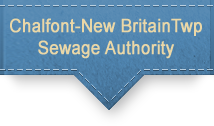Chalfont-New Britain Township Joint Sewage Authority
Biosolids Management Program
The Chalfont-New Britain Township Joint Sewage Authority wastewater treatment facility processes an average of 4.625 million gallons per day, and is the largest wastewater facility in the central Bucks County region. In addition to recycling clean water for steam discharge, the facility also recycles the wastewater by-products, which are returned to the soil as nutrient-rich biosolids. The biosolids are processed to meet strict compliance standards, including metals and pathogens, for the “Beneficial Use of Exceptional Quality Sewage Sludge” as required by the PA DEP and the PA Solid Waste Management Act; and the standards for “Class A Biosolids” under the federal Clean Water Act, Title 40 Part 503.
The CNB Authority has named its product “See ‘n’ Be Green” (aka CNB Green), and has registered it as a Specialty Fertilizer with the PA Department of Agriculture. Nutrient content of CNB Green is generally about 6-6-0, with the Nitrogen being mostly in the organic, slow-release form.
After many years of paying landfill costs to dispose of anaerobically digested de-watered sludge cake, the Authority initiated a biosolids management alternatives study in 2002, with the primary goal of reducing the disposal costs. Many alternatives were considered, including status quo, but the Authority was keenly interested in processes that would produce Class “A”, Exceptional Quality (EQ) biosolids for the purpose of land application, with potentially zero disposal costs. After all the pros and cons of various processes were considered (including embarking on several interesting and entertaining road trips), an indirect batch heat drying process was selected as the best long term option. Reasons cited for the decision were:
- the high probability that 90% dry biosolids would continuously meet the pathogen and vector attraction requirements for Class A / EQ;
- no need for the expense and volume increase associated with chemical addition;
- the greatly reduced volume and weight would reduce material handling, and also reduce landfill disposal costs if land-application were to become not viable for some unknown reason.
After purchase and installation of the 24 dry ton per day dryer, construction of a building over an old drying bed, and about 9 months of shakedown operation, an EQ Permit (PAG-7) was issued by PADEP for land application in February 2004. The Authority had already begun seeking potential users of the new product, and in the first few years, they included a sod farm and an industrial waste recycler that used it as an absorbent/drying agent. Over the past several years, demand for the product has shifted to several local farmers who have been using it as fertilizer primarily on hay fields. One such farmer has commented that he gets an extra cutting in every year when using CNB Green.
The Authority goes beyond the regulatory requirements to ensure that the farmers use best management practices. Before distribution of the product, each farmer is interviewed, proper storage and use of the product is discussed, agronomic rates are reviewed, and an information packet is provided. CNB staff has always welcomed inquiries about the dryer and our program, and conducted many facility tours with water quality professionals who wanted to learn about the Authority’s experience. Tours are also regularly provided to high school students, and other interested groups. These events present opportunities for our profession to promote the benefits of biosolids recycling.
Since startup, about 2900 dry tons of CNB Green have been produced and utilized for a beneficial use. This would have been the equivalent of about 12,000 wet tons that would have been land-filled. Although storage vs. utilization issues in the first few years caused some product to still be land-filled, demand has steadily increased, and in both 2009 and 2010, 100% of the product was distributed to local farmers at no cost to the Authority (or the farmer).
12/15/14

